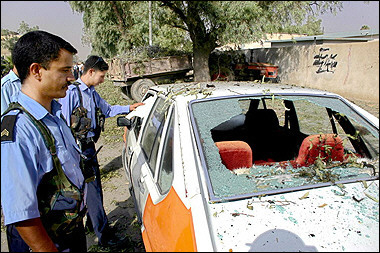|
Suicide attacks kill at least 48 in Iraq
(Agencies)
Updated: 2005-07-11 08:34
A man strapped with explosives blew himself up Sunday at an Iraqi military recruiting center in Baghdad, one of a series of suicide attacks that killed at least 48 people and ended a relative lull in violence in recent days.
Prime Minister Ibrahim al-Jaafari criticized U.S. and multinational forces for shooting at Iraqi civilians who act suspiciously near patrols or military areas, but a spokesman for the U.S. command blamed the problem on the growing use of suicide car bombs as an insurgent weapon.
"Terrorists, through use of suicide (vehicles), have caused this predicament," said Lt. Col. Steven Boylan. "They have affected the normal level of trust that people have for one another and have made it difficult to distinguish between normal traffic and a grave potential threat."

Iraqi police inspect the wreckage of a car that was destroyed at the site where a suicide bomber detonated his booby-trapped car outside Kirkuk's municipal offices, in northern Iraq. [AFP] |
Al-Jaafari said such cases should be handled in a "civilized" way, such as shooting at tires instead of passengers.
But the attacks Sunday highlighted the American complaint. The deadliest bombing hit the army recruiting center at Muthana airfield in central Baghdad when a man dressed in civilian clothes detonated two explosive-laden belts among a crowd of recruits, killing 25 others and wounding nearly 50, U.S. and hospital officials said. Most of the dead were believed to have been recruits.
Al-Qaida in Iraq claimed responsibility in a Web posting, but the statement's authenticity could not be verified. In February, a suicide bomber blew himself up outside the same garrison, killing 21 people.
Sunday's Baghdad bombing was the deadliest since July 2, when a suicide bomber blew himself up outside a recruiting center in west Baghdad's Yarmouk neighborhood, killing 20.
Suicide bombers struck elsewhere across the country:
- At the Walid border crossing into Syria, two suicide car bombers killed at least seven Iraqi customs officials.
- Near the northern city of Mosul, a suicide car bomber rammed into a police convoy carrying an Iraqi brigadier general, killing five policemen, the U.S. military and police said. The senior officer was not injured.
- A suicide car bomb in Kirkuk killed at least four civilians, according to police. A second car bomb was rigged to explode as rescuers rushed to the scene, but it was found and detonated by American troops, police reported.
- Two other suicide car bombers struck near Fallujah, killing an Iraqi civilian and wounding a Marine, the U.S. Marines said.
The U.S. military, meanwhile, released Cyrus Kar, a 44-year-old aspiring filmmaker from Los Angeles who has been detained in Iraq for nearly two months, officials said. Kar, an Iranian-American, was taken into custody May 17 near Balad, 50 miles north of Baghdad, when potential bomb parts were found in a taxi in which he was riding.
One of Kar's lawyers, Mark Rosenbaum, legal director for the American Civil Liberties Union of Southern California, said the government owes Kar and his family an apology "for robbing him of 50 days of his life and creating a never-ending nightmare for them."
The U.S. military defended its detention of Kar.
"This case highlights the effectiveness of our detainee review process," spokesman Air Force Brig. Gen. Don Alston was quoted as saying in the statement. "We followed well-established procedures and Mr. Kar has now been properly released."
Kar's Iranian cameraman also was released from U.S. custody Sunday, but the military said it would continue to hold their taxi driver pending the results of an investigation.
In other violence, a Shiite mother and seven of her children were found shot dead in their beds Sunday in Baghdad. One boy survived, police said. The father, who was not at home at the time, blamed the killings on sectarian hatred.
"This is because we are Shiites. I have no enemies," the distraught father, Hussein al-Tarash, told reporters. "We have no political leanings."
Tensions between minority Sunnis and majority Shiites have risen. Most insurgents are believed to be Sunnis, and Shiites dominate the new Iraqi government.
The body of the kidnapped Iraqi karate association chief was found floating in the Tigris River near Kut, about 100 miles southeast of Baghdad, police and sports official said. Ali Shakir, 38, was abducted Thursday in Latifiyah, about 20 miles south of Baghdad.
Shakir was a former Iraq champion in karate and judo. He also was head of the Babil branch of Iraq's soccer association. "We've lost a champion," said Ahmed al-Hijiya, president of Iraq's Olympic committee.
Also Sunday, al-Jaafari sought to ease tensions with Egypt following the reported kidnap-slaying of Cairo's top diplomat here, Ihab al-Sherif. The envoy was abducted July 2 and al-Qaida claimed in a Web posting to have killed him, although it provided no photos and the body has not been found.
Egyptian officials were enraged after Iraqi authorities criticized al-Sherif for traveling without security and suggested he may have been in contact with insurgents. On Saturday, Egypt had demanded an explanation from Iraq.
"I don't have any information that the late Ihab al-Sherif has conducted a dialogue or was involved in any dialogue or any meeting," al-Jaafari told reporters. "If what's being reported about an official comment is related to me, then I'm categorically denying that."
Egypt said Sunday it will temporarily base its top Iraq-based diplomats in neighboring Jordan to ensure their safety.
|